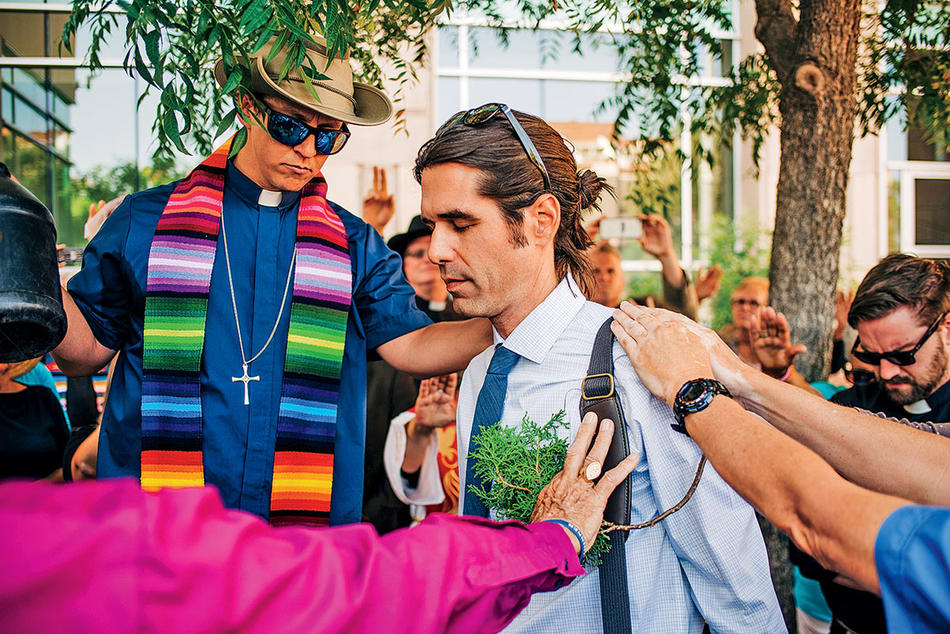In many parts of the United States, Christian-owned businesses can refuse to hire gay or transgender workers, withhold contraceptive coverage from female employees, and deny services to people of other faiths. This is the result of a wave of so-called religious-freedom acts — passed by Congress and more than twenty states since the 1990s — that permit believers to sidestep anti-discrimination and health-care-access laws.
But since social conservatives have no monopoly on faith, you might wonder: can people with more liberal values cite their spiritual beliefs as justification for ignoring certain laws?
A new report, Whose Faith Matters? The Fight for Religious Liberty Beyond the Christian Right, sheds light on the subject. Published by Columbia Law School’s Law, Rights, and Religion Project, it collects the stories of individuals from across the political spectrum who have in recent years sought legal exemptions to engage in otherwise unlawful activities that they consider expressions of faith. They include humanitarian workers who feed and clothe migrants in the American Southwest; physicians who wish to be able to discuss abortion with women at federally funded health clinics in Baltimore; social workers who want to open a supervised injection site for drug users in Philadelphia; and parishioners at a Texas church trying to stop the Trump administration from building its border wall on their grounds.
None of these exemptions have yet been granted, the authors say, in part because legislators, judges, and other government officials tend to look askance at such claims when they come from the left.
“Liberals are often suspected of being guided by political or philosophical aims rather than their religious convictions, especially if they don’t belong to a large denomination,” says Katherine Franke ’81BC, the faculty director of the Law, Rights, and Religion Project and a coauthor of the report.
There are signs that courts are starting to take the religious left seriously, though. Last fall, Scott Warren, an Arizona teacher facing federal charges and a lengthy prison sentence for having provided temporary shelter to two migrants in the Sonoran Desert, was acquitted by a jury after mounting a religious-freedom defense. He admitted to knowingly breaking the law but argued that his spiritual convictions demanded that he help anyone in need.
“This was one of the first times that a federal judge in a criminal case has even allowed a social activist to introduce a religious-freedom argument as part of his or her defense,” says Franke.
According to the new report, the US has a long tradition of granting legal exemptions to people of faith, dating back to the Colonial era, when Quakers and other pacifists were given conscientious-objector status and excused from military service. But until the late twentieth century, such faith-based exemptions were granted only in rare circumstances and typically to ensure the fair treatment of religious minorities. (Permitting Amish parents to homeschool their children, for example.) Franke and her colleagues say that the past quarter century has seen a proliferation of religious-freedom laws that have broken from legal precedent, in that they grant protections to mainstream Christians and force other people to bear significant costs in order to accommodate the Christians’ beliefs.
Of course, liberals’ growing interest in claiming religious-based legal exemptions raises tricky questions, too. For example, if a humanitarian worker is guided by a strictly secular sense of ethics, does he or she have less of a right to help migrants than a believer does? And at what point does the granting of faith-based legal exemptions threaten the foundation of our democracy, creating, in the ominous words of Supreme Court Justice Antonin Scalia, a system in which “each conscience is a law unto itself”?
The new report wrestles with these and similar questions, offering tips to help public figures evaluate the potential impact of future religious-freedom bills and lawsuits. But it ultimately arrives at a simple conclusion: what’s fair for one is fair for all.
“The main takeaway is that we shouldn’t see religious liberty as a conservative value,” says coauthor Elizabeth Reiner Platt. “We must chart a path toward protecting the religious beliefs and practices of all faith practitioners, with the respect and neutrality that the Constitution demands.”
This article appears in the Spring/Summer 2020 print edition of Columbia Magazine with the title "A new twist on religious liberty."



